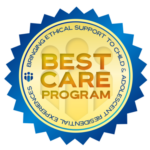Autism is a form of neurodivergence that can present several challenges, including a heightened sensitivity to stimuli and difficulty picking up on social cues. Additionally, recent research suggests autism is a risk factor for developing a substance use disorder. As a parent of a teen with a confirmed or suspected autism diagnosis, here’s what you need to know.
Autism and Addiction – What’s the Connection?
There are many parallels in the behavioral patterns associated with autism and addiction. For example, people with both conditions use repetitive, compulsive habits to cope with emotional problems. Teens who struggle with sensory and social differences may begin drinking or taking drugs to feel “normal,” which can be the first step in developing a substance use disorder.
Despite the progress made in understanding autism and other types of neurodiversity, there are still many challenges, including flawed diagnostic tools that cause some cases of mild autism to go overlooked. If your son has not experienced any developmental delays or intellectual impairments, it can be easy to dismiss other symptoms as typical teen awkwardness. According to researchers at Massachusetts General Hospital, one in five young adults in treatment for alcohol or drug use may have undiagnosed traits characteristic of autism spectrum disorder.
High-Functioning Autism and Smoking
Most studies of autism and substance abuse focus on alcohol and drugs such as stimulants and opioids, neglecting to mention the impact of nicotine addiction. Other addictive substances take the spotlight in our national conversation about public health because they have a higher risk of overdose and can cause people to commit crimes, but smoking, vaping and other forms of tobacco use are highly prevalent and carcinogenic.
While many teens are aware of the dangers of smoking, it can still appeal to autistic people, who experience higher-than-average rates of anxiety and emotional dysregulation. An oral stim such as smoking can help combat these feelings. Nicotine also has a calming effect, and can help relieve the discomfort of gastrointestinal issues that are common among autistic people. Finally, smoking may be attractive to an autistic teen because it provides an excuse to take a break from social situations.
Autism and Co-Occurring Disorders
Though autism itself is not a mental illness, the majority of people on the autism spectrum also struggle with their psychological and emotional well-being. While anxiety is the most common co-occurring disorder, OCD, ADHD and depression are prevalent, too. Some autistic people have PTSD symptoms from years of camouflaging their natural tendencies and trying to fit in.
Self-medicating autism and mental health symptoms can lead to an additional diagnosis – substance use disorder. Fortunately, evidence-based therapies and emotional support can help people learn to manage their symptoms, find healthier coping mechanisms and learn to function better in their daily lives.
At ARCH Academy, we specialize in working with teen boys ages 14 to 17, providing a combination of recovery, academics and adventure. We can help your family heal from the physical and emotional impact of addiction in a judgment-free environment. To learn more, reach out to us today.




